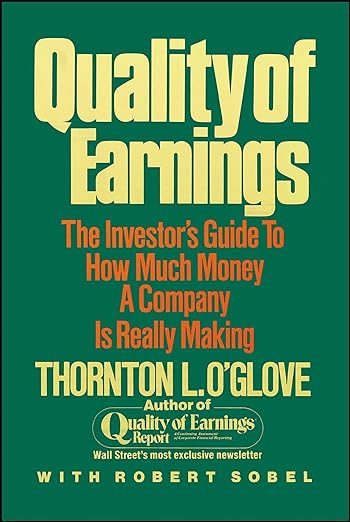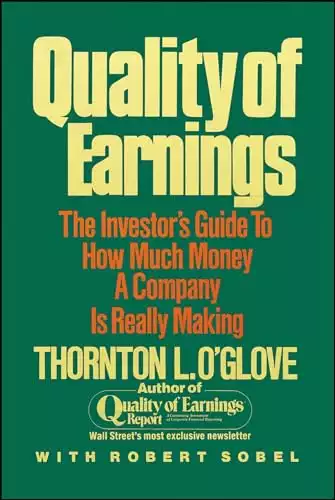Overview : Quality of Earnings
- Book Title: Quality of Earnings
- Author: Thornton L. O'glove
- Publication Date: Originally published in 1987
- price: $16.99
- Pages: 200
Overview of the Book
Thornton L. O'glove is a seasoned financial analyst and author specializing in "Quality of Earnings" reviews. With over 1987 of experience, they provide actionable insights to help investors and businesses make informed decisions based on reliable financial data.
Introduction: Unmasking Corporate Financial Reality
In the complex world of investing and personal finance, understanding a company's true financial health is crucial. Thornton L. O'glove's "Quality of Earnings: The Investor's Guide to How Much Money a Company is Really Making" stands as a beacon for investors navigating the often murky waters of corporate financial reporting. This comprehensive review delves into the book's insights, relevance, and enduring impact on financial analysis.
Book Summary: Decoding the Language of Earnings
O'glove's seminal work, first published in 1987, remains a cornerstone text for investors seeking to unravel the mysteries behind reported earnings. The author, a veteran financial analyst, introduces readers to the concept of "quality of earnings" – a measure of how sustainable and genuine a company's reported profits are.
Key topics covered include:
- Distinguishing between core business earnings and accounting manipulations
- Identifying red flags in financial statements
- Understanding the importance of cash flow analysis
- Recognizing the impact of management incentives on financial reporting
- Evaluating the role of economic cycles in earnings quality
Analysis of Themes: Beyond the Bottom Line
The Art of Financial Detective Work
O'glove positions investors as financial detectives, tasked with uncovering the truth behind corporate earnings. He provides a toolkit for dissecting financial statements, highlighting various accounting techniques that can distort a company's financial reality. This approach is particularly relevant in today's market, where the pressure to meet earnings expectations can lead to creative accounting practices.
Cash Flow: The True Measure of Financial Health
A standout theme in "Quality of Earnings" is the emphasis on cash flow analysis. O'glove argues that while earnings can be manipulated, cash flow provides a clearer picture of a company's financial health. This insight is invaluable for investors looking to assess the sustainability of a company's earnings and its long-term viability.
"Cash flow is the lifeblood of any business. It's much harder to manipulate than earnings and often tells the real story of a company's financial performance." - Thornton L. O'glove
The Human Element: Management Motivations and Market Psychology
O'glove doesn't shy away from addressing the human factors that influence financial reporting. He explores how management incentives and market expectations can lead to decisions that prioritize short-term gains over long-term value creation. This perspective adds depth to the financial analysis, encouraging investors to consider the broader context of a company's operations.
Writing Style: Clarity in Complexity
One of the book's strengths lies in O'glove's ability to demystify complex accounting principles. His writing is clear and engaging, making the material accessible to both novice and experienced investors. The use of real-world examples and practical checklists transforms abstract concepts into actionable insights.
Strengths and Weaknesses: A Balanced Perspective
Strengths:
- Timeless principles of financial analysis
- In-depth exploration of earnings quality
- Practical tools for investors
- Emphasis on investor education and financial literacy
Weaknesses:
- Some examples may feel dated
- Primary focus on U.S. accounting standards
- May require additional reading to fully grasp modern financial instruments
Comparison to Other Works: Standing the Test of Time
While many financial books have come and gone, "Quality of Earnings" remains relevant alongside contemporary works. It complements modern texts like "Financial Shenanigans" by Howard Schilit and "The Most Important Thing" by Howard Marks, offering a foundational understanding of financial analysis that these newer works build upon.
Unlike books focused on market trends or investment strategies, O'glove's work provides a timeless framework for evaluating corporate financial health, making it an essential companion to more dynamic, market-focused texts.
Highlights from Quality of Earnings
- Earnings quality: Focuses on evaluating the sustainability and accuracy of reported earnings.
- Accounting tricks: Highlights how companies manipulate financial statements to appear more profitable.
- Cash flow vs. reported earnings: Stresses the importance of cash flow over accounting profits.
- Red flags: Identifies warning signs of low earnings quality, such as excessive non-recurring items.
- Financial analysis tools: Offers techniques to assess the true financial health of a company.
- Investor awareness: Encourages investors to dig deeper beyond surface-level financial reports.
Conclusion: An Essential Guide for the Discerning Investor
"Quality of Earnings" is more than just a book; it's a manual for financial due diligence. In an era of complex financial instruments and evolving market dynamics, O'glove's teachings on fundamental analysis remain as relevant as ever. Whether you're a seasoned investor or just starting your journey in personal finance, this book offers invaluable insights into the art and science of evaluating corporate earnings.
For those looking to deepen their understanding of financial markets and make more informed investment decisions, "Quality of Earnings" is an indispensable resource. Its lessons on scrutinizing financial statements, understanding cash flow, and recognizing potential red flags are essential skills in today's fast-paced financial landscape.
Ready to sharpen your financial acumen? Click here to get your copy of "Quality of Earnings" and start your journey towards becoming a more informed and successful investor.





